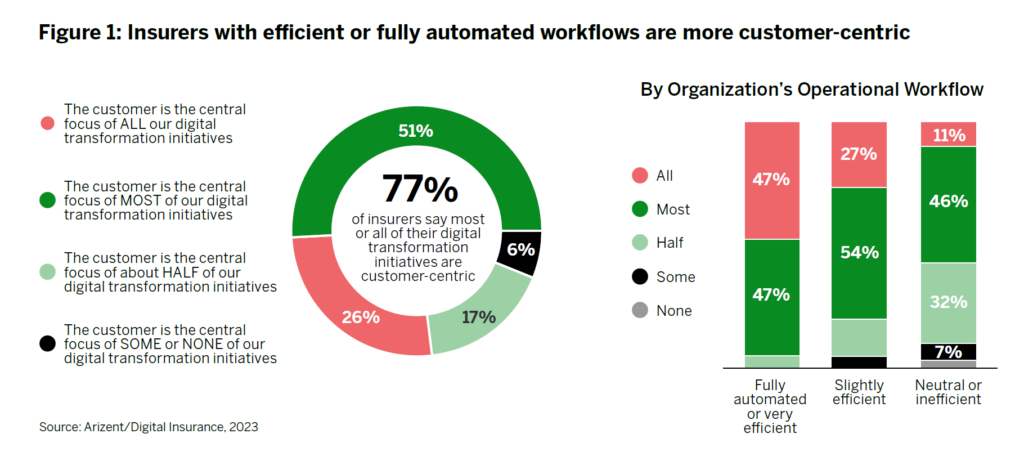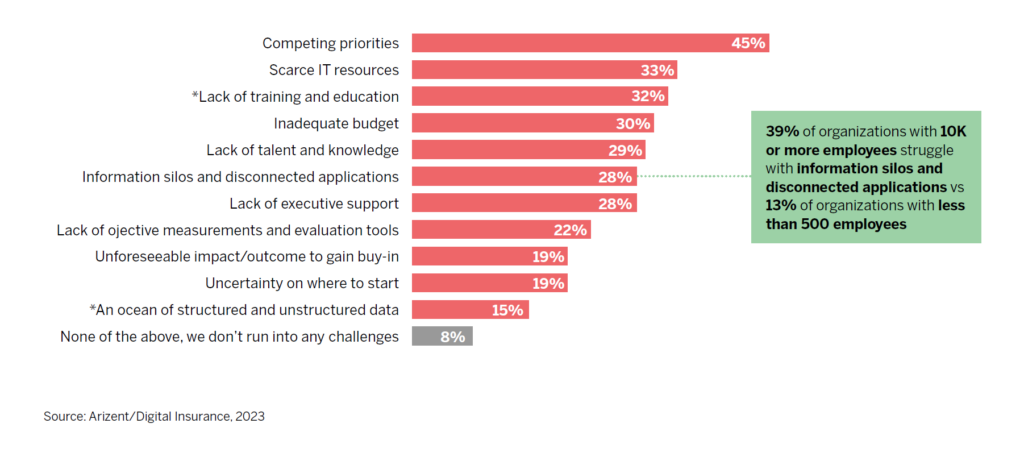Why 77% of Insurers Use Digital Transformation to Improve Customer Experience
By Joman Kwong, Laserfiche strategic solutions manager for financial services
Enhancing the customer experience and optimizing value chain operations are the primary driving forces behind the majority of insurance companies’ digital transformation initiatives in the next two years, as revealed by a recent survey conducted by Arizent Research and Digital Insurance in partnership with Laserfiche.
In May 2023, Arizent Research and Digital Insurance, on behalf of Laserfiche, surveyed 103 insurance leaders working in business process, back-office operations or IT at major insurance carriers.
“In the next two years, the top business priority driving digital transformation is creating a digital-first customer experience and improving customer satisfaction,” said Joman Kwong, strategic solutions manager for financial services at Laserfiche.
“This involves automating processes, such as self-service requests for policy quotes and claims processing, as well as automating frequent communications about the status of claims. These actions can reduce the paperwork burden for customers, enhance transparency, and enable better customer engagement.”
Enhancing Customer Experiences
Seventy-seven percent of insurers report that the majority or all of their digital transformation initiatives are centered around enhancing the customer experience (see Figure 1). In fact, six out of ten insurers indicate that their digital transformation efforts have progressed beyond the stage of digitizing and organizing information, focusing instead on automating and streamlining processes. The positive impact of these automation efforts on the customer experience has not gone unnoticed. Organizations that have increased the efficiency of their operational workflows are more inclined to label their digital transformation initiatives as customer-centric.

Driving Operational Productivity
More than half of insurers are currently exploring automated processes and seeking enhanced operational efficiency. However, despite these efforts, only a small fraction have fully achieved their automation goals. A mere 18% of insurers report that their operational workflows are fully automated and highly efficient. Even more concerning, 20% acknowledge that their operational workflows currently suffer from some degree of inefficiency.
One possible explanation for this lack of progress may be attributed to the absence of data centralization and effective system integrations, a challenge that becomes even more pronounced as organizations expand. Among respondents from organizations with 10,000 or more employees, 39% admit to grappling with information silos and disconnected applications.

The need for automation in various facets of the business continues to grow. Notably, a lack of automation in internal processes could leave the vast majority of insurers (87%) who plan to implement remote or hybrid work models over the next two years unprepared. Without fully automated and efficient workflows, the risk of data loss, human errors, and disruptions in business continuity remains significant in geographically dispersed workplaces. Moreover, without real-time access to data, employees face limitations in their ability to support customers.
Leveraging The Right Technology for Vital Business Outcomes
The findings reveal a shift in priorities, as insurers are reevaluating the driving forces behind digital transformation in the insurance industry. To accomplish these objectives, it is essential to have a centralized information backbone, streamline data entry and processing across the organization, and ensure seamless data integration across various applications to support any automation initiatives.
Want to learn more?
Download the whitepaper, “Establishing More Customer-Focused and Productive Insurance Operations.”
Register the webinar, “Discover Latest Insurance Priorities: Embrace the Power of Process Automation.”

